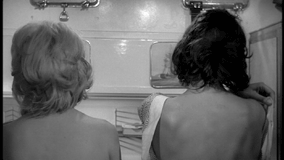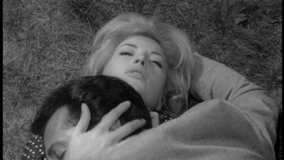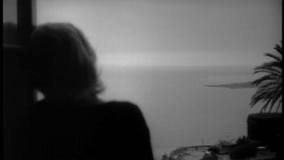LíAvventura (Michelangelo Antonioni) 1960
 Perhaps the quintessential cinematic expression of ennui, Michelangelo
Antonioniís LíAvventura is a movie thatís unflinchingly honest,
even at the expense of audience enjoyment. Who could get sheer pleasure out of
this resolute, deliberate character study? Itís definitely more of a thinking
personís film, but thatís probably because in order to relate to its crisis
one must be overly analytical. After all, the stupid rarely are discontented by
complacency. Theyíre smart enough not to go looking for flaws in pleasureís
faÁade. They donít question it, and accept happiness at face value.
Antonioniís film suggests that thereís always going to be something
turbulent and wrong on the horizon, if only weíre perceptive enough to see it.
Itís not a happy, or even optimistic, movie by any means, and the closest it
comes to a catharsis is the grudging resignation to these harsh realities.
Perhaps the quintessential cinematic expression of ennui, Michelangelo
Antonioniís LíAvventura is a movie thatís unflinchingly honest,
even at the expense of audience enjoyment. Who could get sheer pleasure out of
this resolute, deliberate character study? Itís definitely more of a thinking
personís film, but thatís probably because in order to relate to its crisis
one must be overly analytical. After all, the stupid rarely are discontented by
complacency. Theyíre smart enough not to go looking for flaws in pleasureís
faÁade. They donít question it, and accept happiness at face value.
Antonioniís film suggests that thereís always going to be something
turbulent and wrong on the horizon, if only weíre perceptive enough to see it.
Itís not a happy, or even optimistic, movie by any means, and the closest it
comes to a catharsis is the grudging resignation to these harsh realities.
 Hailed after its Cannes premiere ďfor a new movie language
and the beauty of its images,Ē the movie is indeed adapt in its visual
expression of the internal states of mind of its characters. I wouldnít quite
call its cinematic language unique, however, as its expressionistic imagery
could have been ripped out of a multitude of great silent films. Thatís not a
knock against the film, however, since Antonioniís visual instincts are always
dead on. The film evades ever slipping into self-parody, which is no small feat
considering how close some of the recurrent images (the turbulent waves reflect
the inner turmoil of the characters, the journey through a doorway represents
the development of another character) are to triteness. What saves the movie
from making a joke of itself is its intuitiveness combined with its sheer
conviction. There are many scenes that have a startling level of intimacy, even
by our modern standards. There are no scenes that feel aberrant (and only one
misstep would sink the whole enterprise with these stakes), and as a result, the
movie feels as if it takes place in a cohesive, self-contained alternate world,
where Antonioniís optical embellishments feel utterly natural.
Hailed after its Cannes premiere ďfor a new movie language
and the beauty of its images,Ē the movie is indeed adapt in its visual
expression of the internal states of mind of its characters. I wouldnít quite
call its cinematic language unique, however, as its expressionistic imagery
could have been ripped out of a multitude of great silent films. Thatís not a
knock against the film, however, since Antonioniís visual instincts are always
dead on. The film evades ever slipping into self-parody, which is no small feat
considering how close some of the recurrent images (the turbulent waves reflect
the inner turmoil of the characters, the journey through a doorway represents
the development of another character) are to triteness. What saves the movie
from making a joke of itself is its intuitiveness combined with its sheer
conviction. There are many scenes that have a startling level of intimacy, even
by our modern standards. There are no scenes that feel aberrant (and only one
misstep would sink the whole enterprise with these stakes), and as a result, the
movie feels as if it takes place in a cohesive, self-contained alternate world,
where Antonioniís optical embellishments feel utterly natural.
 In the depiction of his characters, Antonioni stumbles
slightly, however. One canít help but feel that the portrayals of Claudia
(Monica Vitti) and Sandro (Gabriele Ferzitti) hew a bit too closely to
stereotypical conceptions of women and men. Sheís deeply in touch with her
emotions, and throughout the film works through her carnal desires and lack of
self-definition and ends up as an asexual mother figure. Heís an insensitive
lout, and remains one. Itís a bit simple, really, even if thereís a lot of
truth in those simplifications. Itís no great surprise that when they couple,
sparks donít fly, since theyíre going about their sexual relationship with
vastly different intentions. That the movie is so resolutely calm about such
disparities is at once flabbergasting and refreshing. Its very real
existentialist angst becomes suffused mostly by the unseen presence of
Antonioni, who has placed it in a context where it is not only necessary (it
provides the impetus for the plot) but also expected (since Antonioni has
conceived of symbolism to represent it).
In the depiction of his characters, Antonioni stumbles
slightly, however. One canít help but feel that the portrayals of Claudia
(Monica Vitti) and Sandro (Gabriele Ferzitti) hew a bit too closely to
stereotypical conceptions of women and men. Sheís deeply in touch with her
emotions, and throughout the film works through her carnal desires and lack of
self-definition and ends up as an asexual mother figure. Heís an insensitive
lout, and remains one. Itís a bit simple, really, even if thereís a lot of
truth in those simplifications. Itís no great surprise that when they couple,
sparks donít fly, since theyíre going about their sexual relationship with
vastly different intentions. That the movie is so resolutely calm about such
disparities is at once flabbergasting and refreshing. Its very real
existentialist angst becomes suffused mostly by the unseen presence of
Antonioni, who has placed it in a context where it is not only necessary (it
provides the impetus for the plot) but also expected (since Antonioni has
conceived of symbolism to represent it).
* * * *
05-24-02
Jeremy Heilman